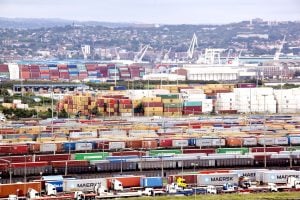Carbon credits and renewable certificates – what South Africa’s new trade platform means

The Johannesburg Stock Exchange (JSE) has launched the JSE Ventures Carbon Market, in collaboration Xpansiv, a US-based infrastructure provider for global environmental markets.
The new trading platform allows local participants to buy or sell carbon credits and renewable energy certificates (RECs) held in local or global registries, and adds another tool to mitigate climate change.
Carbon credits are tradeable certificates that represent a one metric tonne reduction in carbon dioxide emissions that companies can use to offset their own carbon emissions when it is not possible to do so through operational changes.
The credits are generated through projects that reduce emissions, like renewable energy projects or reforestation efforts.
In South Africa, when a company is unable to reduce its carbon emissions, the government allows for them to offset these emissions through credits for tax purposes.
The JSE Ventures Carbon Market is new platform that allows for these trades.
Renewable energy certificates differ from carbon credits by the units in which they are measured, the sources they originate from, their use and purpose, and the environmental claims they support.
According to legal experts at ENS, South African carbon taxpayers may reduce their direct carbon tax liabilities by acquiring eligible carbon credits and offsetting those carbon credits against their taxable greenhouse emissions.
By contrast, the RECs can lower an organisation’s scope 2 emissions relating to purchased electricity.
Carbon trading is likely to become a major factor in the coming years as National Treasury looks to tap into further tax sources and environmental, social, and governance (ESG) targets get increasingly tied up in corporate regulations.
The Financial and Fiscal Commission has already suggested that the Treasury hike carbon taxes to fill the country’s budget gap.
Concerns surrounding Voluntary Carbon Markets
ENS said that there are some concerns around voluntary carbon markets – generally surrounding whether or not the credits and certificates represent the carbon reductions in reality.
“Increasingly, companies are under pressure to make climate commitments or to back up the claims or commitments which they have made. The VCM offers an opportunity for corporates to achieve their decarbonisation strategies through trading in carbon credits where they cannot achieve reduction through a change in operations.
“Given that the market is voluntary, participants need to be able to trust that they are entering into credible carbon transactions if the market is to succeed in driving decarbonisation in the real world,” it said.
“If the credits purchased through the market do not, in fact, reference a reduction of carbon, or such reduction cannot be reliably verified, or there is a risk of double-counting or lack of additionality, then the market in fact hinders decarbonisation efforts, providing a way for corporates to avoid having to decarbonise their operations while still being able to make claims around decarbonisation.”
Besides the need for credible market infrastructure, clarity is also required around the claims that corporations can make once they have acquired carbon credits.
“This is important to avoid the risk of ‘greenwashing’ risk where corporates rely on the VCM as part of their decarbonisation strategy,” the group said.
For South Africa and Africa more generally, the legal experts also noted that there is currently more demand for than supply of credits.
“While Africa is well positioned for carbon projects, developers face regulatory and cost uncertainty. For example, it is important that the holder of the rights to a land-based carbon credit project has proper security of tenure and secure rights to the land on which the project will take place.”
This aspect faces a lot of uncertainty given the fight over land in South Africa as well as the heavy regulatory hurdles that need to be overcome to get decarbonisation projects off the ground.
“In addition to these project-related considerations, developers will need to ensure that they raise sufficient finance to fund the project development, its verification and possibly on-going costs relating to management of the credit scheme. These costs can be a barrier to entry for smaller projects,” ENS said.




















